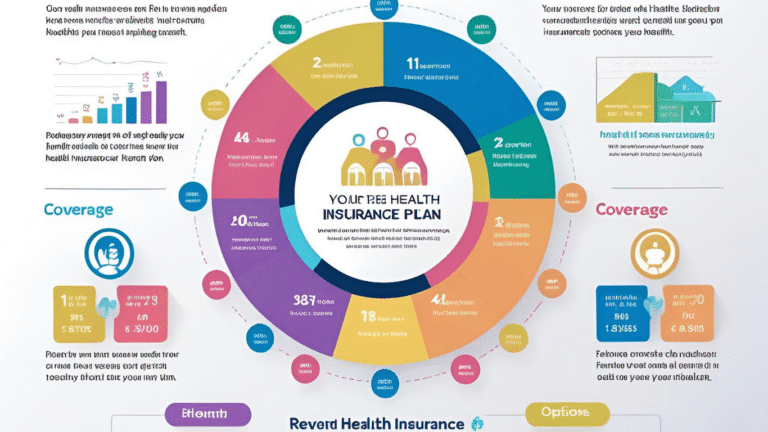The Rise of Mental Health Apps: Are They Effective?
In recent years, the use of mental health apps has skyrocketed in the U.S., especially as more Americans seek convenient, affordable, and stigma-free support for their mental well-being. From guided meditations to therapy chatbots, these digital tools claim to help users manage anxiety, depression, stress, and more — but are they actually effective?
Let’s take a closer look at the rise of mental health apps, what they offer, and whether they live up to their promises.
📈 Mental Health in the U.S.: Why Apps Are Booming
Several trends have fueled the explosion of mental health apps in America:
- Increased anxiety, stress, and depression, particularly after the COVID-19 pandemic
- A shortage of mental health professionals, especially in rural and underserved areas
- Rising therapy costs and limited insurance coverage
- Stigma that prevents some people from seeking in-person help
- Smartphone culture, where people prefer digital-first solutions
In 2024, an estimated 20,000+ mental health-related apps were available on iOS and Android, with millions of Americans using them regularly.
🧠 What Mental Health Apps Claim to Offer
Mental health apps typically fall into a few categories:
1. Meditation & Mindfulness
- Examples: Calm, Headspace, Insight Timer
- Focus: Reducing stress, improving sleep, managing anxiety
2. Therapy & Counseling Access
- Examples: BetterHelp, Talkspace
- Focus: Matching users with licensed therapists via chat, video, or phone
3. Mood & Habit Tracking
- Examples: Moodnotes, Daylio, Sanvello
- Focus: Helping users track mood swings, thought patterns, and habits
4. Cognitive Behavioral Therapy (CBT) Tools
- Examples: Woebot, MindShift
- Focus: Teaching users how to manage negative thought cycles with evidence-based techniques
✅ The Benefits of Mental Health Apps
1. Accessibility
Digital mental health tools have revolutionized access to support by making resources available anytime, anywhere. With just a smartphone, tablet, or computer, people can access a wide range of services—from self-guided therapy and mindfulness apps to chatbots and live therapy sessions—often 24/7. This level of immediate access was rarely possible with traditional in-person care.
For individuals in rural, remote, or underserved areas, where mental health professionals may be scarce, digital tools offer a vital lifeline. They eliminate long wait times and reduce the need for travel, which can be costly or difficult for those with disabilities, caregiving duties, or limited transportation.
These platforms also help overcome social and cultural barriers by providing anonymity and privacy, reducing stigma and encouraging more people to seek help. Younger generations, in particular, often prefer digital formats, finding them easier to engage with.
Additionally, many digital solutions include multilingual support and accessibility features like text-to-speech and adjustable fonts, broadening their reach to diverse populations.
In summary, while not a full replacement for traditional therapy, digital mental health tools play a crucial role in making care more inclusive and widely available.
2. Affordability
Affordability is another key advantage of digital mental health tools. Traditional therapy, especially in private practice, can be cost-prohibitive for many people — with hourly rates often ranging from $100 to $250 or more, depending on the provider and location. In contrast, many mental health apps and online platforms are free or offer low-cost subscription models, making support far more financially accessible.
Some platforms use a freemium model, offering essential features at no cost while charging for premium content like personalized coaching or one-on-one therapy sessions. Others are supported by public health systems, universities, or nonprofit organizations, further reducing or eliminating costs for users.
This cost-effectiveness makes digital tools especially valuable for uninsured or underinsured individuals, students, and people in low-income communities who may not otherwise have access to mental health care. Even for those already in therapy, these tools can serve as a supplemental resource between sessions, helping to reinforce strategies and provide ongoing support without additional expense.
By lowering the financial barrier, digital mental health tools open the door for more people to seek and sustain help — an essential step toward making mental health care more equitable and widespread.
3. Anonymity
For many people, the stigma surrounding mental health remains a significant barrier to seeking help. Digital mental health tools offer a level of anonymity and discretion that traditional, in-person care often cannot. Users can explore mental health support from the privacy of their own homes, without the need to disclose their struggles to family, employers, or even a therapist face-to-face.
This sense of privacy can be particularly appealing for individuals in small communities, where seeing a local therapist might raise concerns about being recognized, or for those from cultural backgrounds where mental health issues are less openly discussed. With apps and online platforms, users can engage in self-guided programs, journaling, mood tracking, or even chat-based therapy without revealing their identity.
In some cases, the ability to remain anonymous actually encourages people to open up more honestly, especially when discussing sensitive topics like trauma, addiction, or suicidal thoughts. This can lead to more effective support and, eventually, a greater willingness to seek more structured or long-term care.
While anonymity has its limitations—especially when safety concerns arise—it plays a crucial role in lowering the emotional threshold for getting help, making mental health support more approachable for those who might otherwise stay silent.
4. Consistency
One of the strengths of digital mental health tools is their ability to help users build and maintain consistent daily habits that support emotional well-being. Whether it’s journaling, guided breathing exercises, mindfulness meditation, or mood tracking, many apps provide reminders, prompts, and easy-to-use interfaces that encourage regular engagement.
This consistent practice can be crucial in managing stress, anxiety, and depression over time. Unlike traditional therapy, which may happen once a week or less, apps are available anytime and anywhere, empowering users to integrate mental health care into their daily routines. Regular use can help individuals recognize patterns in their mood and behavior, better understand triggers, and practice coping strategies proactively.
By promoting ongoing self-care habits, these digital tools help users take an active role in their mental health, leading to potentially stronger, longer-lasting benefits.
5. Supplement to Traditional Therapy
Digital mental health tools are increasingly recognized by therapists as valuable supplements to in-person or online therapy sessions. While they don’t replace professional care, many therapists recommend apps and platforms to help clients practice skills, track progress, and stay engaged between appointments.
These tools can provide exercises in cognitive behavioral therapy (CBT), mindfulness, or stress management that reinforce what’s discussed during sessions. They also offer convenient ways to log moods, set goals, or access educational content at any time. This continuous engagement supports better outcomes by encouraging consistency and self-awareness outside the therapist’s office.
By combining traditional therapy with digital tools, clients receive a more comprehensive and flexible approach to mental health care tailored to their unique needs and lifestyles.
⚠️ The Limitations & Risks
While mental health apps have benefits, they’re not perfect:
1. Lack of Regulation
One of the biggest concerns with mental health apps is the lack of formal regulation. Unlike prescription medications or medical devices, most mental health apps are not reviewed or approved by the U.S. Food and Drug Administration (FDA). This means that there is no standardized process to ensure the safety, accuracy, or effectiveness of these digital tools before they reach users.
As a result, the quality of apps can vary widely. Some are developed with input from licensed mental health professionals and backed by scientific research, while others are created without any clinical oversight. This inconsistency can make it difficult for users to know which apps are genuinely helpful and which may offer little more than generic advice—or worse, spread misinformation.
Without clear oversight, there’s also a risk that sensitive user data may not be properly protected. Privacy policies can be vague or non-compliant with healthcare data standards like HIPAA, leaving users exposed.
In short, while mental health apps offer promising support, the current lack of regulation raises serious concerns about their reliability, safety, and ethical standards.
2. Privacy Concerns
Some apps collect sensitive data with unclear privacy policies.
3. Not a Substitute for Professional Care
While mental health apps can offer helpful tools like mood tracking, guided meditation, or cognitive behavioral prompts, they are not equipped to diagnose or treat serious mental health conditions. Disorders such as bipolar disorder, schizophrenia, severe depression, or PTSD require comprehensive evaluation, diagnosis, and ongoing care from qualified mental health professionals.
Apps lack the ability to assess complex symptoms in context, identify nuanced warning signs, or provide personalized treatment plans. Relying solely on an app for support could delay someone from seeking the professional care they truly need, potentially worsening their condition.
In short, mental health apps can be valuable supplements to care—but they should never be viewed as replacements for licensed therapy, medication management, or psychiatric evaluation when dealing with moderate to severe mental health issues.
4. Digital Fatigue
While digital tools can enhance connection and productivity, increased screen time often leads to digital fatigue—a state of mental exhaustion stemming from prolonged exposure to digital devices. For some users, especially those already managing stress or anxiety, this constant connectivity can actually amplify feelings of overwhelm, disconnection, or even anxiety. The pressure to stay responsive, the influx of notifications, and the absence of face-to-face interaction can make digital engagement feel more draining than energizing.
🔍 So, Are They Effective?
The short answer: It depends.
🧪 Research Says:
- Apps using CBT techniques (like Woebot or Sanvello) have shown moderate effectiveness in reducing anxiety and depressive symptoms in some studies.
- Mindfulness and meditation apps can help reduce stress and improve sleep with regular use.
- Therapist-matching platforms are convenient but vary in therapist quality and user experience.
Effectiveness often comes down to how users engage with the app — occasional use offers less benefit than daily interaction over time.
✅ How to Choose the Right Mental Health App
Here are a few tips if you’re considering using a mental health app:
- Check for evidence-based methods (CBT, DBT, mindfulness)
- Read user reviews and ratings
- Review the privacy policy — avoid apps that sell your data
- Start with a free version before committing to paid features
- Look for clinician involvement in the app’s development
🧩 Final Thoughts
Mental health apps aren’t a magic cure, but they can be valuable tools for self-awareness, emotional regulation, and daily support — especially for people navigating the stresses of modern American life. They work best when used intentionally, as part of a broader mental wellness strategy that may include therapy, lifestyle changes, and social connection.
TL;DR:
- Are they effective? Yes — for many users, especially with regular use and realistic expectations.
- Are they enough? Often, no — apps should supplement, not replace, professional care when needed.
📱 Popular Mental Health Apps to Explore
| App | Type | Platform | Cost |
|---|---|---|---|
| Headspace | Meditation | iOS, Android | Free + paid |
| Woebot | AI CBT chatbot | iOS, Android | Free |
| BetterHelp | Therapy platform | Web, App | Subscription |
| Sanvello | CBT, Tracking | iOS, Android | Free + paid |
| Moodnotes | Mood journaling | iOS | Paid |

Silvia Heart is a lifestyle and wellness writer with a background in apparel and a degree in fashion. She blends creativity with practical insights, guiding readers toward intentional, balanced living. Through her approachable style and thoughtful storytelling, Silvia inspires her community to embrace both everyday joy and personal growth.


